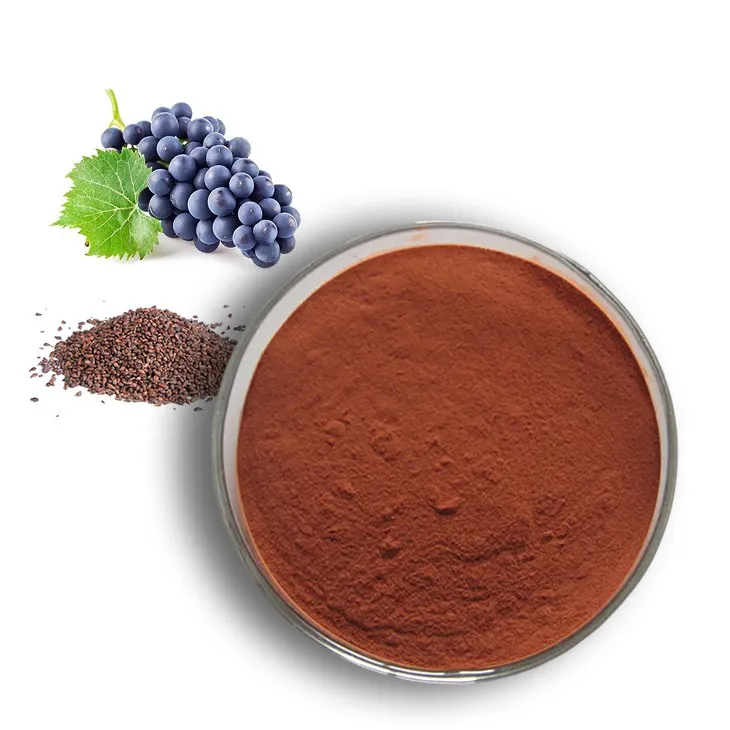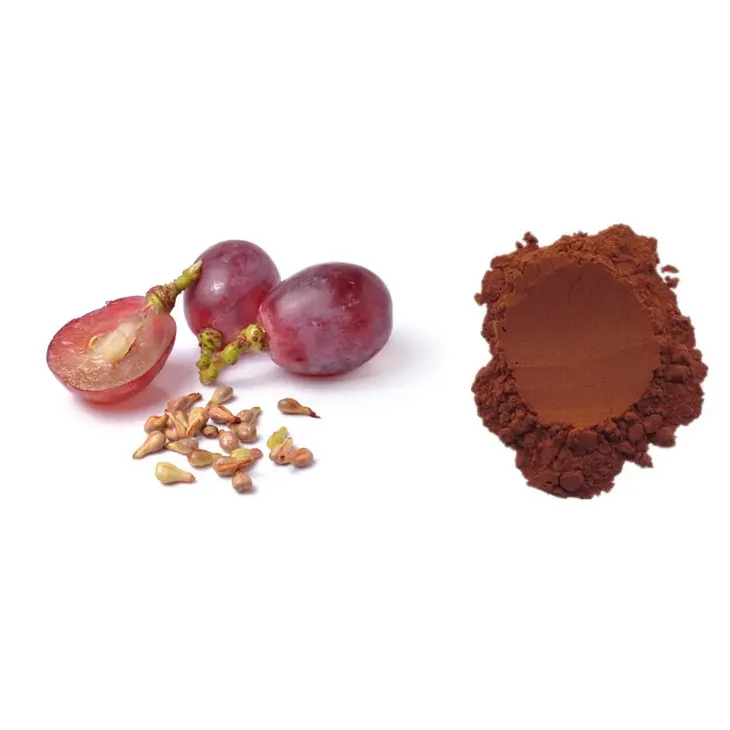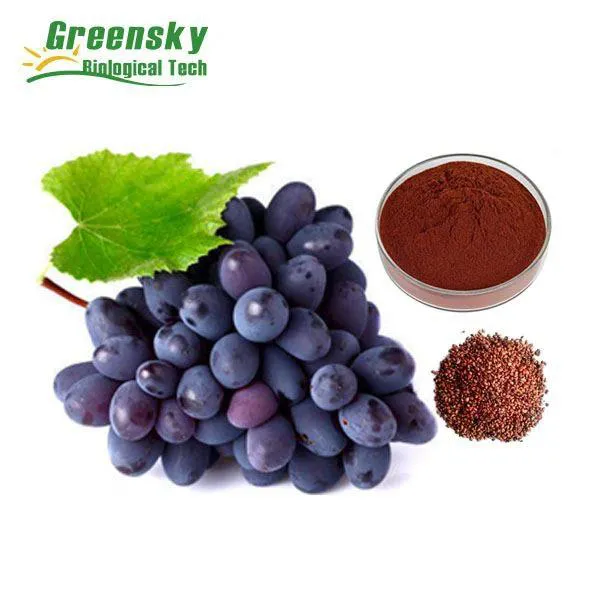- 0086-571-85302990
- sales@greenskybio.com
Natural Grape Seed Extract: Is the Extract Effective for Weight Loss?
2024-11-13

1. Introduction
In recent years, the search for natural and effective weight - loss aids has been on the rise. One such substance that has caught the attention of many is Grape Seed Extract. This natural extract is derived from the seeds of grapes and is known for its numerous health - promoting properties. However, the question remains: can it actually help with weight loss? In this article, we will delve into the various aspects of Grape Seed Extract to determine its potential effectiveness in shedding pounds.

2. Grape Seed Extract: A Brief Overview
Grape seed extract is rich in a variety of bioactive compounds, including proanthocyanidins, flavonoids, and phenolic acids. These compounds are responsible for its antioxidant, anti - inflammatory, and other health - beneficial effects. The antioxidant properties of grape seed extract are particularly notable, as they can help protect the body from oxidative stress caused by free radicals.
Traditionally, grape seed extract has been used in alternative medicine for various health conditions, such as improving cardiovascular health, reducing the risk of certain cancers, and enhancing skin health. But its potential role in weight loss is a relatively new area of investigation.

3. Effects on Energy Expenditure
3.1. Metabolism Boost
One of the ways in which grape seed extract may potentially aid in weight loss is by increasing energy expenditure. Some studies suggest that the bioactive compounds in grape seed extract can stimulate the body's metabolism. A faster metabolism means that the body burns more calories at rest, which can contribute to weight loss over time.
For example, in animal studies, grape seed extract has been shown to increase the activity of certain enzymes involved in metabolism. However, it is important to note that while these results are promising, human studies are still limited, and more research is needed to confirm the same effects in humans.
3.2. Thermogenesis
Another aspect related to energy expenditure is thermogenesis. Thermogenesis is the process by which the body generates heat, and it can also contribute to calorie burning. Grape seed extract may play a role in enhancing thermogenesis.
Some researchers believe that the flavonoids in grape seed extract can increase the activity of brown adipose tissue (BAT). BAT is a type of fat tissue that burns calories to generate heat, as opposed to white adipose tissue which stores calories. By increasing BAT activity, grape seed extract could potentially boost calorie expenditure.

4. Influence on Lipid Metabolism
4.1. Cholesterol and Triglyceride Levels
Grape seed extract has been shown to have an impact on lipid metabolism. It may help in reducing cholesterol and triglyceride levels in the blood. High levels of cholesterol and triglycerides are associated with an increased risk of obesity and other cardiovascular problems.
Studies have indicated that the proanthocyanidins in grape seed extract can interfere with the absorption of dietary cholesterol in the intestines. Additionally, it may also enhance the breakdown of triglycerides in the liver. By improving lipid metabolism in these ways, grape seed extract could potentially contribute to weight loss, as it helps in maintaining a healthier lipid profile.
4.2. Fat Oxidation
Another important aspect of lipid metabolism is fat oxidation. Grape seed extract may promote the oxidation of fat in the body. This means that it can encourage the body to use stored fat as an energy source instead of relying solely on carbohydrates.
In vitro and some animal studies have shown that grape seed extract can increase the expression of genes related to fat oxidation. However, again, more human - based research is required to firmly establish this effect in humans.

5. Impact on Cravings
Controlling cravings is a crucial part of any weight - loss plan. Grape seed extract may have some potential in this regard as well. Some researchers believe that its antioxidant and anti - inflammatory properties can help regulate the body's hormonal balance.
Hormonal imbalances, such as those related to insulin and leptin, can often lead to increased food cravings. By helping to keep these hormones in check, grape seed extract may reduce cravings for sugary and high - calorie foods. However, at present, there is limited evidence to support this theory, and more studies are needed to explore this potential benefit further.

6. Quality and Dosage for Weight - Loss Benefits
6.1. Quality of Grape Seed Extract
When considering using grape seed extract for weight loss, the quality of the product is of utmost importance. High - quality grape seed extract should be standardized to a certain percentage of active compounds, such as proanthocyanidins.
Look for products that are from reliable sources and have been tested for purity and potency. Poor - quality grape seed extract may not contain the necessary bioactive compounds in sufficient amounts to produce any potential weight - loss effects.
6.2. Dosage
The appropriate dosage of grape seed extract for weight loss is still not clearly defined. In some studies, dosages ranging from 100 - 300 mg per day have been used, but the optimal dosage may vary depending on factors such as an individual's age, gender, and overall health status.
It is important to note that taking excessive amounts of grape seed extract may not necessarily lead to better weight - loss results and may even pose potential risks. Therefore, it is advisable to consult a healthcare professional before starting any supplementation regimen.
7. Associated Risks
While grape seed extract is generally considered safe for most people when taken in appropriate doses, there are some potential risks to be aware of.
- Allergic Reactions: Some individuals may be allergic to grape seed extract. Symptoms of an allergic reaction can include skin rashes, itching, swelling, and in severe cases, difficulty breathing.
- Interactions with Medications: Grape seed extract may interact with certain medications. For example, it may enhance the effects of blood - thinning medications, increasing the risk of bleeding. It is important to inform your doctor if you are taking any medications and plan to use grape seed extract.
- Gastrointestinal Issues: In some cases, high doses of grape seed extract may cause gastrointestinal problems such as nausea, vomiting, and diarrhea.
8. Conclusion
In conclusion, grape seed extract shows some potential in aiding weight loss through its effects on energy expenditure, lipid metabolism, and potentially on reducing cravings. However, the current evidence is still limited, especially in human studies.
Before considering grape seed extract as a weight - loss aid, it is crucial to ensure the quality of the product, determine the appropriate dosage, and be aware of the associated risks. More research is needed to fully understand its effectiveness and safety in promoting weight loss. Overall, while it may be a promising natural supplement, it should not be seen as a substitute for a healthy diet and regular exercise in the pursuit of weight loss goals.
FAQ:
1. What are the main components in Natural grape seed extract?
Natural grape seed extract contains various bioactive components, mainly proanthocyanidins. Proanthocyanidins are powerful antioxidants that can have multiple effects on the body's physiological functions.
2. How does grape seed extract affect energy expenditure?
Some studies suggest that grape seed extract may influence energy expenditure by enhancing mitochondrial function. Mitochondria are the powerhouses of cells, and by improving their function, it might increase the body's basal metabolic rate, which could potentially contribute to weight loss. However, more research is needed to fully understand this mechanism.
3. Can grape seed extract really improve lipid metabolism?
Yes, it may have an impact on lipid metabolism. Grape seed extract has been shown in some experiments to reduce lipid peroxidation and improve lipid profiles. It may help the body break down fats more efficiently and prevent the accumulation of excess lipids, which is beneficial for weight management.
4. Is there a specific dosage of grape seed extract for weight loss?
There is no one - size - fits - all dosage for using grape seed extract for weight loss. However, in general, dosages typically range from 100 - 300 mg per day in most studies. But it's important to note that individual responses can vary, and it's always best to consult a healthcare professional before starting any supplement regimen.
5. What are the potential risks of taking grape seed extract?
Some people may experience mild side effects such as nausea, headache, or dizziness when taking grape seed extract. In addition, it may interact with certain medications, for example, blood - thinning medications. So, if you are on any medications, it is crucial to inform your doctor before taking grape seed extract.
Related literature
- The Effects of Grape Seed Extract on Obesity: A Review"
- "Grape Seed Proanthocyanidins and Their Role in Metabolism and Weight Management"
- ▶ Hesperidin
- ▶ Citrus Bioflavonoids
- ▶ Plant Extract
- ▶ lycopene
- ▶ Diosmin
- ▶ Grape seed extract
- ▶ Sea buckthorn Juice Powder
- ▶ Fruit Juice Powder
- ▶ Hops Extract
- ▶ Artichoke Extract
- ▶ Mushroom extract
- ▶ Astaxanthin
- ▶ Green Tea Extract
- ▶ Curcumin
- ▶ Horse Chestnut Extract
- ▶ Other Product
- ▶ Boswellia Serrata Extract
- ▶ Resveratrol
- ▶ Marigold Extract
- ▶ Grape Leaf Extract
- ▶ New Product
- ▶ Aminolevulinic acid
- ▶ Cranberry Extract
- ▶ Red Yeast Rice
- ▶ Red Wine Extract
-
Astaxanthin
2024-11-13
-
Cactus Extract
2024-11-13
-
Almond Extract Powder
2024-11-13
-
Lavender Extract
2024-11-13
-
Green Tea Extract
2024-11-13
-
Elderberry Extract
2024-11-13
-
Longan Extract
2024-11-13
-
Alfalfa Meal
2024-11-13
-
Buckthorn bark extract
2024-11-13
-
Nutmeg Extract
2024-11-13





















